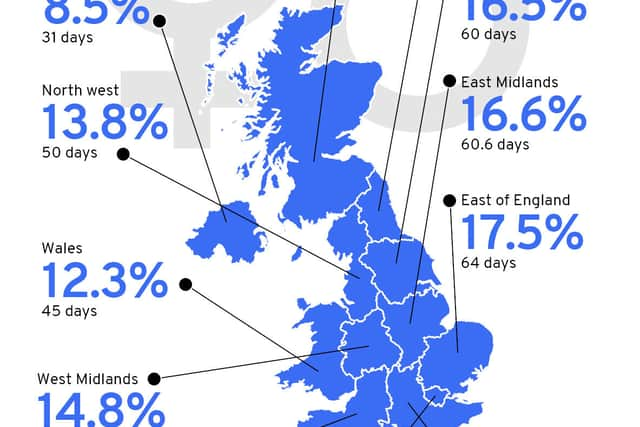Gender pay gap means women work for free two months of the year compared to men, TUC finds
and live on Freeview channel 276
Women work “for free” nearly two months of the year compared to the average man, according to new research.
Analysis by the Trades Union Congress (TUC) reveals a 15% gender pay gap that widens “dramatically after women have children.
Advertisement
Hide AdAdvertisement
Hide AdThe pay gap means that working women must wait 54 days - nearly eight weeks, or two months - before they stop working for free, the union organisation said.
Women aged between 50 and 59 have the highest pay gap (20.8%) and work the equivalent of 76 days for free, while for those aged 60 and over it is 18.4%. The latter work 67 days of the year for free before they stop working for free, according to the research.
The gender pay gap widens once a woman becomes a mum and older women take a financial hit for balancing work alongside caring for older relatives as well as children and grandchildren, the TUC said.


The analysis also shows that gender pay gaps are bigger in some parts of the country, with the South East of England having the largest gap at 17.9%. This is followed by the East of England at 17.5% and the East Midlands at 16.6%.
Advertisement
Hide AdAdvertisement
Hide AdThe TUC said the regional variations are likely to be caused by differences in the types of jobs and industries that are most common in that part of the country.
The overall gender pay gap is calculated using all median hourly pay, excluding overtime, for all male and female employees using the latest Office for National Statistics (ONS) Annual Survey of Hours and Earnings (ASHE) data.


TUC general secretary Paul Nowak said: “Working women deserve equal pay, but at current rates of progress, it will take more than 20 years to close the gender pay gap. That’s just not good enough. We can’t consign yet another generation of women to pay inequality.
“It’s clear that just publishing gender pay gaps isn’t working. Companies must be required to publish action plans to explain what steps they’ll take to close their pay gaps, and bosses who don’t comply with the law should be fined.
Advertisement
Hide AdAdvertisement
Hide Ad“The pandemic highlighted that we can do more to help women balance their caring responsibilities and work. Flexible working is key to keeping mums in jobs and is our best way of closing the gender pay gap.
“We should change the law so that all jobs are advertised with all the possible flexible options clearly stated, and all workers must have the legal right to work flexibly from their first day in a job.
“It’s clear that the gender pay gap widens dramatically once women become mums. We need ministers to fund childcare from the end of maternity leave to support working parents, along with better wages and recognition for childcare workers.
“Dads and partners need better rights to well-paid leave that they can take in their own right. Otherwise, mums will continue to take on the bulk of caring responsibilities and continue to take the financial hit.”
Advertisement
Hide AdAdvertisement
Hide AdThe TUC said its study of official data showed that since 2011 the gender pay gap had fallen by an average of 0.4 percentage points a year, adding that at the current rate of progress, it will take until 2044 for pay parity to be achieved between men and women.
A government spokesperson said: “The government has taken significant action to support women at work. We have spent over £3.5 billion in the last three years to support families with the cost of childcare, and in December we announced that millions of employees will be able to request flexible working from day one of their employment.
“Wages are a decision for individual companies, but we strongly urge organisations to take steps to ensure female employees reach their full potential.”
Comment Guidelines
National World encourages reader discussion on our stories. User feedback, insights and back-and-forth exchanges add a rich layer of context to reporting. Please review our Community Guidelines before commenting.
